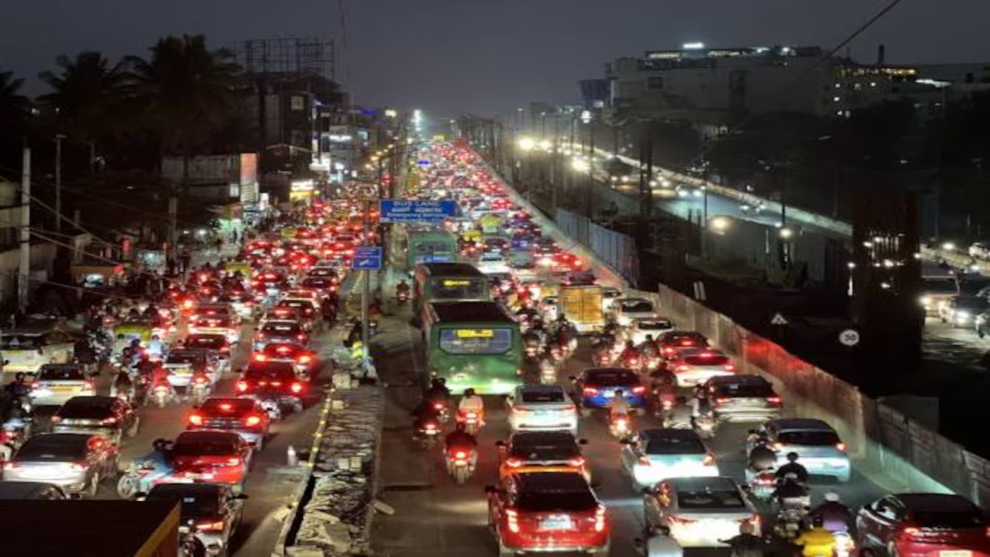Tech capital Bengaluru is set to leverage state-of-the-art technology to monitor its traffic. In 2022, Bengaluru, which has more than 1 crore vehicles, was ranked as the second-most congested city, globally. As part of the Bengaluru city road safety and traffic management project, the traffic police are embracing advanced tech solutions, for which tenders have been floated recently.
AI-based search engine
Police officials said that they will use advanced data analytics to monitor traffic jams on 20 major roads in the city, including Outer Ring Road, Old Madras Road, Old Airport Road, Hosur Road, Bellary Road, Mysuru Road, Tumakuru Road, and Bannerghatta Road (see box). The selected firm will develop an artificial intelligence (AI)-based search engine to manage traffic.
“AI software (smart traffic engine) will primarily aid us in monitoring the congestion levels/ vehicle queue lengths on 20 identified high-density corridors,” Joint commissioner of police (Bengaluru traffic), MN Anucheth, told Moneycontrol. “Insights from data analytics will enable us to understand patterns in traffic congestion, accidents, and violations, as well as road user perceptions sourced from multiple third-party platforms.
Predictive analytics will play a key role, providing advanced alerts for upcoming congestion, along with responsive action plans” a senior police official
“Travel time along 20 major roads, including congestion on the neighbourhood network during morning and evening peak hours, based on the third-party source will also be generated,” he said.
Separately, it will generate road accident data analytics, with hotspots as well as traffic violation data provided by the city police. The search engine will also facilitate road user perception analytics to understand sentiments by monitoring comments and reactions by users on social media pages.
It will facilitate predictive analytics for congestion on key corridors, advanced congestion alerts, and response plans. Video-based analytics will process videos from third-party sources to get traffic volume counts at junctions and mid-blocks, according to officials.
Map APIs for traffic management
The police will also harness the potential of Map APIs for dynamic traffic management.
“The selected firm will come up with a map application that will have an application with Bengaluru city jurisdictions, and key corridors overlapped on the base map, with an open street map or equivalent,” said an official.
Traffic police will report events on a map to create events, update status, attach images, and also report events from the field using any messaging platform such as WhatsApp, Telegram, etc.
“It will capture data on factors affecting traffic, including accidents, vehicle breakdowns, tree falls, water-logging, and others. This data will be made public and shared with researchers to develop solutions,” said Anucheth.
It will also have a special event calendar, in which police will be able to enter all upcoming events that might impact traffic. The selected firm will integrate data from monitoring devices and store the data in the analytical database in the cloud.
Emoji speed alert display boards on major roads
The police will also install speed display boards at select locations on 20 high traffic-density corridors. The speed display range will be 5-199 kmph, the detection range will be 5-300 metres, and display visibility will be more than 300 metres. A variable message board of 160x640mm, with ‘slow down’ for overspeed and ‘drive safe’ for safe speed, will also display a red-faced emoji for overspeed and a smiling face in green for safe speed.
“We will install display boards on roads that see overspeeding, including Airport Road, Electronics City flyover, and the Goruntuapalya – Nayanadahalli road. These boards will be strategically placed in such areas,” said Anucheth.
PTZ cameras at high rise buildings
The city police will install PTZ cameras on 12 major junctions as part of the traffic surveillance system.
“We will also install cameras on high-rise buildings at 12 major junctions. Currently, we are utilising three drones, and an additional five drones will be procured soon,” Anucheth stated. It will also procure 1,000 metal barricades, 5,000 tubular cones (plastic bollards), 5,000 road stud reflectors (cat’s eyes), and thermoplastic road markings at major junctions under the Bengaluru city road safety and traffic management project.
Source: Money Control
















